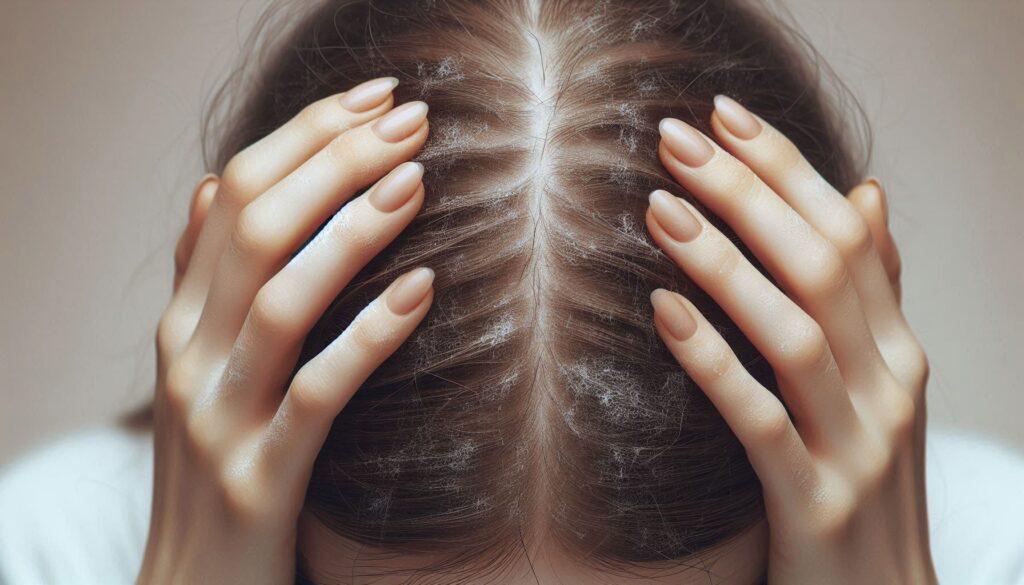When it comes to hair care, most of the focus tends to be on the hair itself. We spend hours choosing the perfect shampoo, applying hair masks, and experimenting with different haircuts. But what about the very foundation of our hair—the scalp? The health of your scalp is crucial, not only for the overall health of your hair but also for preventing scalp conditions like dandruff. While many may dismiss dandruff as an annoying cosmetic issue, it actually signals a deeper imbalance in the scalp’s health, which requires attention and care. By understanding the science of the scalp and its direct connection to dandruff, you can take proactive steps to ensure your scalp remains healthy, flake-free, and glowing.
Understanding the Science of the Scalp and Its Role in Hair Growth
Your scalp, much like your skin, is a complex ecosystem composed of oil glands, hair follicles, and a delicate microbiome of bacteria and fungi. It plays a vital role in the health and growth of your hair, serving as the foundation from which each strand emerges. Just like the skin on your face, the skin on your scalp is sensitive to external factors such as pollution, weather, and products. This sensitivity makes it prone to imbalances that can result in dandruff, dryness, oiliness, or other scalp conditions.
The scalp’s oil glands (sebaceous glands) are responsible for secreting sebum, a natural oil that keeps the scalp hydrated and protects the hair. However, when this oil production is disrupted—either by overproduction or underproduction—it can lead to scalp problems. If the oil on the scalp is allowed to accumulate or isn’t properly managed, it can mix with dead skin cells, creating the flaky, white, or yellowish patches commonly associated with dandruff.
The Link Between Scalp Health and Dandruff
Dandruff is primarily caused by an imbalance in the scalp’s natural processes. One of the key players in dandruff development is a yeast-like fungus called Malassezia. This microorganism is present on everyone’s scalp, but for some people, it can become overactive, leading to scalp irritation and excessive shedding of skin cells. As these skin cells die and slough off, they combine with oils from the scalp to form visible flakes.
Several factors can contribute to this imbalance. Hormonal changes, stress, diet, and weather conditions can all affect the scalp’s ability to regulate oil production, creating an environment conducive to dandruff. Poor scalp hygiene, overuse of harsh hair care products, and insufficient hydration can also play a role. When the scalp’s barrier is weakened, it becomes more susceptible to irritation and inflammation, which can further exacerbate dandruff and other scalp conditions.
The Importance of Keeping Your Scalp Healthy
Maintaining a healthy scalp is about much more than just preventing dandruff. A healthy scalp is essential for hair growth, strength, and overall appearance. When your scalp is in good condition, hair follicles function more efficiently, and hair growth is supported. An unhealthy scalp, on the other hand, can lead to clogged hair follicles, slowed hair growth, and even hair loss in severe cases. Therefore, taking care of your scalp isn’t just about aesthetics—it’s about fostering an environment where your hair can thrive.
In addition, a well-maintained scalp promotes a balanced microbiome, which is essential for warding off issues like dandruff. By keeping the scalp clean, hydrated, and nourished, you help create an optimal environment for the good bacteria that protect against harmful microbes like Malassezia.
Tips for Keeping Your Scalp Healthy and Flake-Free
Now that we understand the science behind scalp health and dandruff, it’s time to explore actionable steps you can take to keep your scalp in optimal condition.
First and foremost, it’s important to adopt a regular scalp cleansing routine. Washing your hair regularly helps remove excess oil, dirt, and dead skin cells that can build up on the scalp. However, it’s essential to strike a balance—overwashing can strip your scalp of its natural oils, while under-washing can allow buildup that contributes to dandruff. The ideal frequency for washing your hair depends on your hair type and scalp condition. For some, once every few days is enough, while others may need to wash their hair more frequently.
When selecting hair care products, consider gentle, sulfate-free shampoos that are formulated to cleanse the scalp without stripping it of moisture. Shampoos containing ingredients like salicylic acid, zinc pyrithione, or ketoconazole are specifically designed to combat dandruff by targeting Malassezia and reducing scalp inflammation. If you suffer from a particularly dry scalp, opt for moisturizing formulas containing aloe vera, tea tree oil, or chamomile, which can soothe irritation and balance oil production.
Exfoliating your scalp can also help maintain a healthy environment by removing dead skin cells and promoting better circulation. There are scalp exfoliating scrubs available, or you can gently massage the scalp using your fingertips or a soft brush to encourage blood flow and aid in the removal of buildup. Scalp massages not only improve circulation but can also help to alleviate stress, which is a common trigger for dandruff flare-ups.
Another crucial step in scalp care is hydration. Just like your skin, your scalp needs moisture to stay healthy. If you have dry skin on your scalp, using a lightweight, hydrating conditioner can help restore moisture. Alternatively, you can apply natural oils such as coconut oil, argan oil, or jojoba oil to your scalp, which nourish the skin, promote hydration, and have anti-inflammatory properties. Be sure to apply these oils sparingly to avoid clogging the hair follicles.
Diet plays a significant role in scalp health. What you eat has a direct impact on the condition of your skin and scalp. A diet rich in vitamins, minerals, and healthy fats can help maintain a balanced scalp. Omega-3 fatty acids, found in foods like salmon, walnuts, and flaxseeds, can help keep your scalp moisturized and reduce inflammation. Zinc, found in pumpkin seeds and legumes, plays a role in regulating oil production, while vitamin B12 and biotin are known to promote healthy hair and scalp.
Lastly, stress management is crucial when it comes to scalp health. Chronic stress has been linked to a variety of skin and scalp conditions, including dandruff. Practicing relaxation techniques, such as yoga, meditation, or deep breathing exercises, can help alleviate stress and maintain overall scalp health.
Taking care of your scalp is the first step toward achieving beautiful, healthy hair. A well-nourished and properly maintained scalp creates an environment where your hair can grow strong and vibrant. By understanding the science behind scalp health and dandruff, you can make informed choices that benefit both your scalp and your hair. With the right products, practices, and habits, you can keep your scalp free from flakes, reduce irritation, and cultivate a healthy, thriving mane. After all, your scalp deserves the same level of attention and care as the hair it supports.





